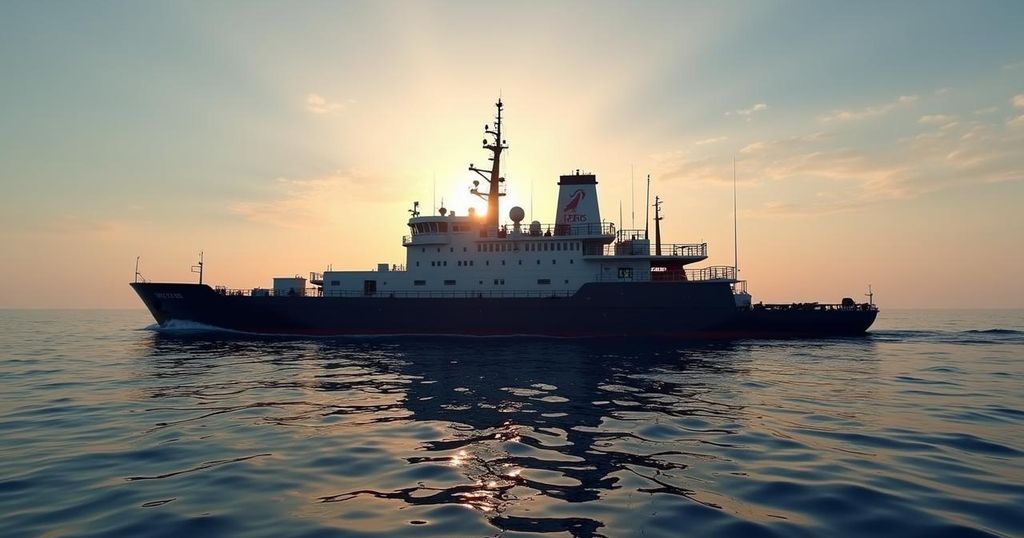Turkish President Recep Tayyip Erdoğan announced the departure of the Oruç Reis seismic research vessel for Somalia on October 5, 2024, following a bilateral agreement concerning energy exploration. The vessel is accompanied by two naval frigates for protection as it undertakes significant 3D seismic surveys that may lead to future drilling sites. This mission reflects Turkey’s strategic interests in the Horn of Africa amidst ongoing tensions in the Eastern Mediterranean over energy claims.
On October 5, 2024, Turkish President Recep Tayyip Erdoğan officiated the launch of the Oruç Reis seismic research vessel, which is embarking on a mission to Somalia. This significant event marks the culmination of an agreement established in March between Turkey’s Ministry of Energy and Natural Resources and Somalia’s Ministry of Petroleum and Mineral Resources, facilitating exploration of both onshore and offshore blocks within Somali territories. Accompanying the Oruç Reis are two G-class frigates, TCG Gediz and TCG Gokova, which are tasked with providing essential naval protection throughout the operation. These frigates, upgraded versions of the Oliver Hazard Perry-class, have been equipped with advanced systems, including the GENESIS combat management system, to bolster their operational capabilities in complex maritime settings. This mission underscores Turkey’s strategic ambitions in the Horn of Africa where it has been granted exploration rights over a vast 15,000-square-kilometer maritime area off the coast of Somalia. The upcoming operation, which is projected to span approximately seven months, will involve the Oruç Reis conducting 3D seismic surveys in various licensed zones. The data yielded from these surveys is expected to play a pivotal role in pinpointing prospective drilling sites for future resource extraction. Furthermore, the deployment of Turkish naval forces exemplifies Ankara’s commitment to protecting its energy interests, particularly in regions characterized by heightened security risks, including piracy and regional conflicts. This operation not only reinforces Turkey’s growing influence within Africa but also reflects broader aspirations to secure energy resources beyond the Mediterranean, where the Oruç Reis had previously engaged in contentious explorations.
The Oruç Reis seismic research vessel has been involved in several contentious exploration endeavors, particularly in the Eastern Mediterranean. Here, Turkey’s ambitions for energy resources have led to direct confrontations with neighboring countries such as Greece and Cyprus, primarily regarding claims over Exclusive Economic Zones (EEZs) in the resource-rich maritime territories. Turkey’s explorations began in earnest in 2020, focusing on areas near the Greek island of Kastellorizo, which both nations claim under differing interpretations of maritime boundaries. Turkey’s stance is that islands should not be granted full EEZ rights, a position that diverges notably from the views held by Greece and Cyprus based on the United Nations Convention on the Law of the Sea (UNCLOS). It is worth noting that Turkey is not a signatory to UNCLOS and advocates for a more adaptable interpretation of maritime jurisdictions to safeguard its interests in contested waters. These operations have heightened tensions between Turkey and Greece, provoking military responses, diplomatic protests, and calls for sanctions from the European Union. Various near-miss military confrontations between Turkish and Greek naval forces occurred, leading NATO to intervene and initiate a deconfliction mechanism intended to avert accidental hostilities between the two NATO allies.
In conclusion, the deployment of the Oruç Reis seismic research vessel to Somalia signifies Turkey’s strategic maneuvers in securing energy resources beyond its traditional boundaries. The partnership with Somalia—a nation rich in untapped resources—along with accompanying naval protection, illustrates Ankara’s commitment to safeguarding its energy interests in volatile regions. As Turkish naval forces establish their presence in the Horn of Africa, it reinforces Turkey’s broader ambitions to expand its influence and resource acquisition strategies in the region, potentially altering the dynamics of international engagement in Africa’s maritime zones.
Original Source: www.armyrecognition.com






